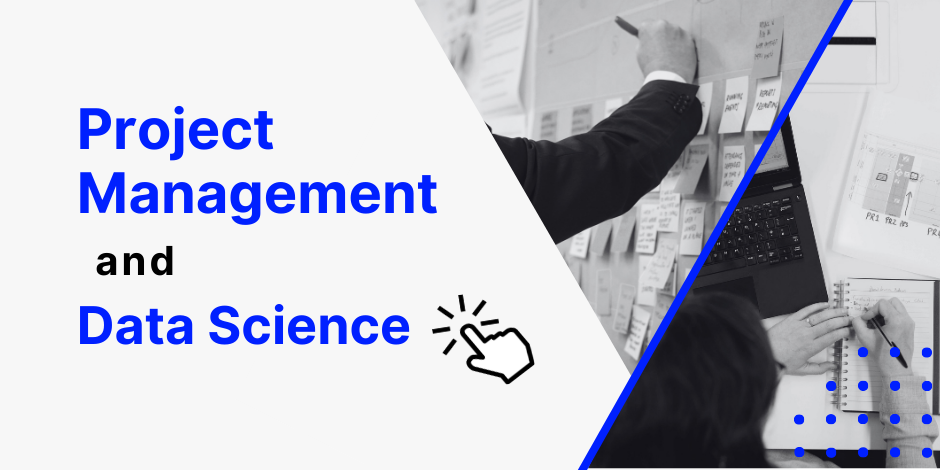Project Management and Data Science

Stay Informed With Our Weekly Newsletter
Receive crucial updates on the ever-evolving landscape of technology and innovation.
Data scientists have gained immense value over the years due to the combination of technical and non-technical skills they possess, and as demand rises, data professionals must be able to continue to evolve their skill sets to stay relevant.
Did you know, employers are seeking data professionals with skills in project management? This is because skills in project management and data science support each other and enable data professionals to more effectively and efficiently work with stakeholders to solve business problems, implement solutions and monitor outcomes.
Today’s data scientist must be agile with the ability to creatively solve problems and find meaningful insights from data. As skills in communication and project management become essential traits of the ideal data science candidate, it is important to understand how project management and data science work together and can help you become a more effective data professional.
What is the role of a project manager?

A project manager is confident liaising with relevant and changing stakeholders and is in charge of the successful completion of projects by initiating, planning, designing, controlling and defining project steps/tools to use, and by monitoring teams, tasks and processes to ensure on-target execution. Project managers are able to identify key risks that can directly impact the successful operations of a business and they have the aptitude to constantly monitor, measure and minimise these risks throughout the lifetime of a project.
Project managers promote teamwork, accountability, and present opportunities for different team members to collaborate and map out how outcomes will be achieved. In addition to minimising risks associated with a project or existing business operations, project managers usually have domain knowledge about a particular field, possess strong critical thinking, time management and communication skills, and understand the importance of being transparent with stakeholders to manage expectations while working to achieve the desired outcomes.
Today there are many different digital tools, techniques and frameworks a project manager can utilise depending on client preference, budget, the type or size of a project etc. but the core responsibilities of a project manager working in any industry sector will always involve:
- Stakeholder liaising
- Activity planning and sequencing
- Time estimations
- Cost estimations/development of budgets
- Resource management
- Risk analysis/problem-solving
- Process optimisation/testing
- Team leadership
- Change management
- Monitoring & reporting project progress and performance
- Quality control
- Project deliverables
Project management tools and techniques you can use for data science projects
Data science heavily relies on project management techniques, tools and methodologies to successfully achieve deliverables, optimise processes, and fast track business and team performance over time.
In order to reduce discrepancies in deliverables and ensure a good return on investment, the use of advanced project management tools is a must when executing data science projects. Here’s an introduction to a few project management tools/frameworks that are commonly used by data professionals today:
Agile/Scrum
As a project unfolds, the flexible and iterative Agile framework enables teams to prioritise and be responsive to the evolving and unpredictable nature of fast-paced data science projects. This results-based process involves the following steps: plan, build, test, evaluate, adapt and repeat until the desired/best/recently set outcome is reached.
The Scrum framework is one of the most popular Agile approaches. This allows for quick development and testing within small, self-managed teams through backlogs and short cycles or sprints. Each sprint has a fixed duration and end goals. Data teams favour Data Driven Scrum (DDS) – which combines the traditional concept of Scrum with data science project practices to address key challenges as they develop. DDS also accounts for iterations and project cycles that vary in length. Scrum tools you may know: Monday.com, Jira, ProjectManager, Nutcache, Axosoft.
RAID Log
Risks, Assumptions, Issues, Dependencies (RAID), this process enables data professionals to prepare, be informed, and tackle projects through a data science lens by defining the business problem/question and keeping structured notes to help form the solution through making assumptions during data preparation, planning out next steps, identifying risks, liaising with stakeholders, executing, monitoring cross-team deliverables, evaluating, and keeping track of project achievements and set-backs for ongoing assessment of the entire problem to solution timeline. RAID logs and ongoing monitoring also assist with future project planning.
CRISP-DM
Cross-industry Standard Processes for Data Mining (CRISP-DM) is a data mining approach made up of 6 phases. Although CRISP-DM is not the most modern approach when it comes to larger teams, these 6 phases are user-friendly and can be applied to data science and analytics projects so this approach is still widely used among data professionals. The CRISP-DM project phases involve understanding the business problem/project objectives at hand, understanding the data, data preparation/cleansing, data modeling, evaluation and deployment. It is also recommended that stakeholder feedback is collected and considered throughout the CRISP-DM process. CRISP-DM tools you may know: RapidMiner, Orange.
Project management and data science opportunities

Every business collecting data wants to extract actionable insights by identifying hidden trends and patterns to stay competitive and improve products, processes, and the customer experience – this is why trained data professionals are in global demand. In response to this growing industry need to leverage data insight, many professionals are taking the initiative to upskill and strategically move into data focused roles that also value their domain knowledge.
Project managers usually have in depth domain knowledge about a particular area of industry or they have general knowledge about a variety of areas. This insight enables them to manage diverse projects and technical teams without needing to execute the technical components of a project themselves.
However, with today’s rapidly evolving data landscape and relentless focus on return on investment (ROI), experienced project managers have the unique opportunity to quickly accelerate their job prospects and career progression by gaining practical skills in data science, analytics and machine learning. Data skills and knowledge are in-demand across industry sectors and from an employer’s perspective, project managers with practical data skills can help with hiring more data professionals for projects as needed, and will be able to more closely and effectively work with data teams to achieve quality project outcomes, monitor short term / long term success, and more accurately predict risks.
Having skills in project management and data science will also increase the profile of a project manager by enabling them to contribute to projects and help formulate solutions on a technical level. This duality will lead to becoming a more valued team member, higher income prospects, sought after skillsets, and the freedom to take on more diverse and impactful data science and AI projects that require technical knowledge.
Through the evolution of big data, project and stakeholder management skills have become essential for professionals looking to work in the fast-paced data industry. Additionally, a project manager that can also collect and collate data, make sense of structured and unstructured data sets, analyse and present relevant insights to stakeholders to optimise projects and outcomes, will stand out to hiring managers and employers.
Conclusion
The Institute of Data’s data science & AI curriculum incorporates project management and business consulting skills to ensure our data professionals are job-ready. If you’re looking to add to your skillset – book a free career consultation and learn more about becoming certified in data science & AI by industry experts.




